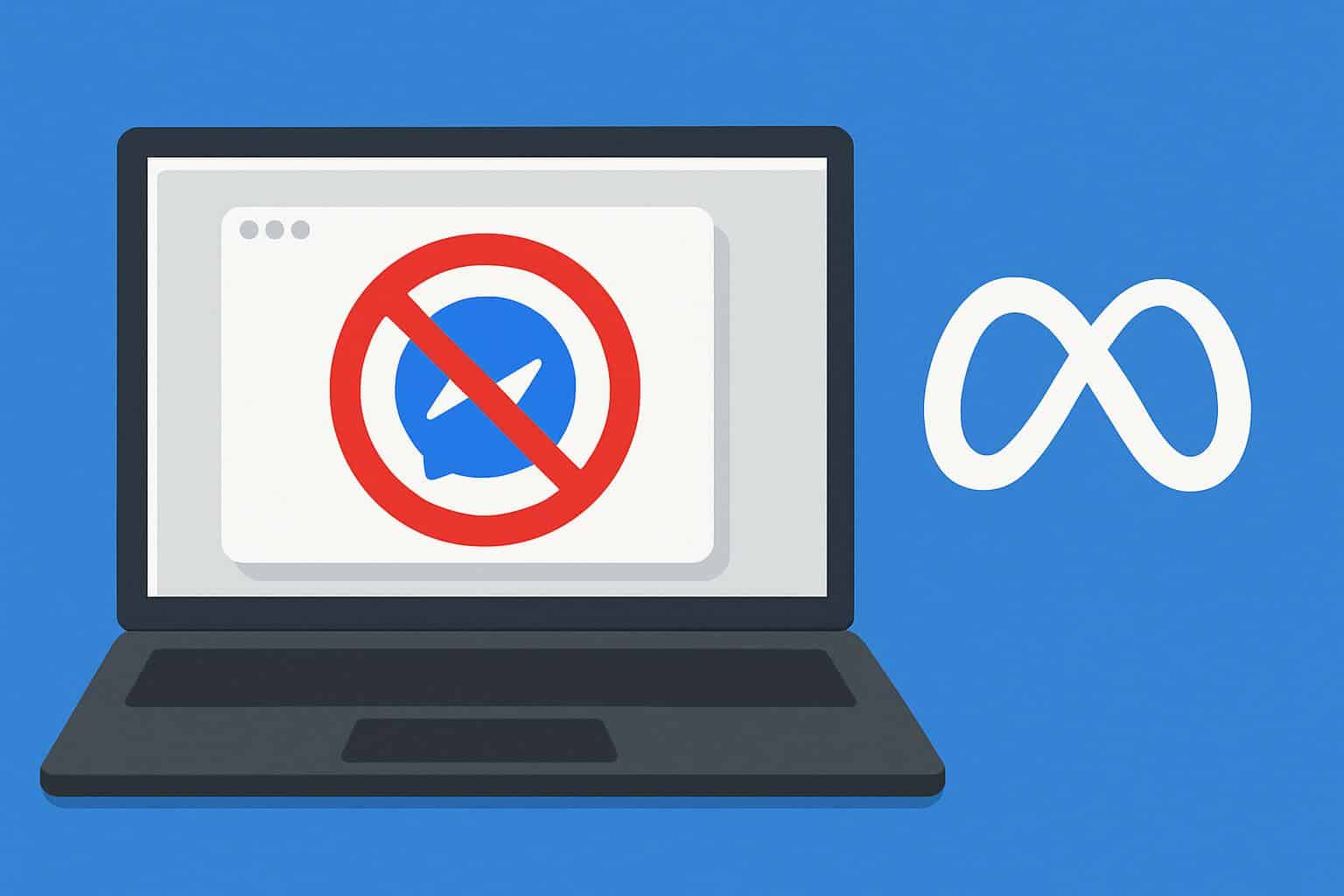Meta is shutting down the standalone Messenger apps for macOS and Windows, directing desktop users to the experience on the web, as well as (on Windows) to Facebook’s own desktop app. After the cutoff date, logins on native clients will be rejected and users will be redirected to Facebook’s site to keep their conversations going.
What’s New for Messenger on Desktop After App Shutdown
People who are using the desktop apps now will receive an in-app notification detailing that an update is available, Messenger’s help center says. Mac users will have 60 days from the start of that notice, according to the company, before the app no longer works at all — and Meta suggests it then be deleted.
- What’s New for Messenger on Desktop After App Shutdown
- Why Meta Is Cutting Off the Tap on Desktop Messenger Apps
- Safe Storage and Conversation History for Web Transition
- Effects on Workflows and Alternatives for Power Users
- The Larger Move to Web Apps Across Desktop Platforms
- What Users Can Do Now to Prepare for the Messenger Shift

Windows users can still chat through the desktop Facebook app and on web-based Messenger. For Mac users, the switch will be to Messenger on Facebook.com, or use the service as a browser-based app. AppleInsider and other industry observers marked the wind-down as Meta let users know.
Why Meta Is Cutting Off the Tap on Desktop Messenger Apps
This moves us toward the more performant, conversational Messenger we’ve always dreamed of delivering — taking advantage of dynamic content that is personable, immersive and works seamlessly during actual usage — without incurring additional end-user latency from scripting network requests to manage individual chat state changes across multiple chat systems.
Today’s news builds on our recent work on the Messenger architecture, which resulted in the expansion of end-to-end encryption and cross-platform messaging — Prometheus. Keeping up with two distinct native desktop codebases, in addition to iOS, Android and web, is costly and hinders feature parity.
Progressive Web App technology has come a long way — it now supports the majority of messaging use cases, including push notifications, quick loading, and background updates. With billions of messages being sent each day, the web route makes sense for a service in which agility and security updates matter more than how native UI doodads look.
Industry data points from companies like Comscore and data.ai always have message time skewed to mobile, and the percentage of it on desktop is also smaller. When it comes to desktop, those operating system figures on StatCounter underscore how spread out support can be between Windows builds and versions of macOS, which further legitimizes the notion of a single browser-first strategy.
Safe Storage and Conversation History for Web Transition
The company is advising users to opt in to secure storage with a PIN before they completely switch over to the web interface. Secure backup offers a way to restore end-to-end encrypted chats across devices while still not being accessible to anyone without the PIN. The feature operates under Privacy & Safety in Messenger’s settings, by clicking on End-to-End Encrypted Chats and then Message Storage.
After turning on secure storage, your conversation history should sync between platforms, such as the web.

This is crucial for those who depend on long-lived threads, media attachments and shared files in work or family groups.
Effects on Workflows and Alternatives for Power Users
Those who preferred multi-window chat in the native apps, tight keyboard shortcuts or a tidy Dock/taskbar icon may miss them most.
Social media managers and customer support teams who keep a Messenger window open at all times of the day likely also want to do that within Safari.
With Windows you’re still free to use the Facebook desktop app if you prefer it for messaging. On Windows and Mac, you can install Messenger as its own standalone Progressive Web App through Chrome, Edge or any other Chromium browser: head to Messenger on Facebook.com and download it to your desktop from the browser menu and enable notifications. That provides the near-native experience with system alerts, badges and pinned icons without hogging system resources like a native client would.
(Mac users accustomed to the one-app-per-site model, incidentally, can also make their own site-specific apps by using regular browser features or third-party wrappers.) In practice, the web version now supplies the features that most people rely on (thread search, file sharing, speech notes and group calls) directly and is updated more frequently than the ancient desktop binaries.
The Larger Move to Web Apps Across Desktop Platforms
Meta’s shift here is part of a bigger trend: plenty of communication platforms are standardizing on web tech for the desktop, whether it’s in the form of PWAs or Electron-based shells. The math is easy — ship features once, minimize regressions, stay in sync with security patches. The support for notifications, media permissions and hardware acceleration has also been upgraded by browser vendors — to the point that they are beginning to catch up with native apps.
Even so, trade-offs remain. Native apps may still provide better OS integration or possibly use less memory. But for large messaging services, the web stack’s uniformity and speed often trump those benefits.
What Users Can Do Now to Prepare for the Messenger Shift
- Open the desktop app to see whether there’s a deprecation announcement and timeline; if you’re on a Mac, you’ll get a 60-day countdown once notified.
- Set up secure storage and a recovery PIN in Messenger’s privacy settings to keep encrypted chats safe and synchronized.
- Install the web app so you can launch it quickly, with system notifications via a PWA; Windows users can also use the Facebook app.
- Back up all important media or files from chats, and when the native app stops functioning, uninstall it to avoid confusion.
- For most people the change will be seamless; power users can spend a few minutes setting up the browser-based experience to reduce friction.

